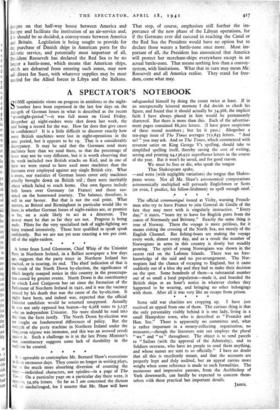A SPECTATOR'S NOTEBOOK
OME optimistic views on progress in antidotes to the night- bomber have been expressed in the last few days on the strength of German losses in what is described as the recent "moonlight-period "—it was full moon on Good Friday. Altogether 45 night-raiders were shot down last week, the total being a record for the war. How far does that give cause for confidence? It is a little difficult to discover exactly how many British machines were lost in night-operations in the same period, but it appears to be 19. That is a considerable discrepancy. It may be said that the Germans send more machines here than we send there, so that the percentage of losses may not be very different, but it is worth observing that the week included two British attacks on Kiel, and in one of them we were stated to have used more machines than the Germans ever employed against any single British city. What is more, our statistics of German losses cover only machines actually brought down on British soil ; there were inevitably others which failed to reach home. Our own figures include both losses over Germany (or France) and those sus- tained on the homeward journey. The balance, therefore, is well in our favour. But that is not the real point. What matters, as Bristol and Birmingham in particular would like to know, is whether German losses of night-raiders are, or promise to be, on a scale likely to act as a deterrent. The answer must be that so far they are not. Progress is being made. Pilots for the very specialised task of night-fighting are being trained intensively. Those best qualified to speak speak confidently. But we are not yet near exacting a ten per cent. toll of the night-raiders. * *


























 Previous page
Previous page